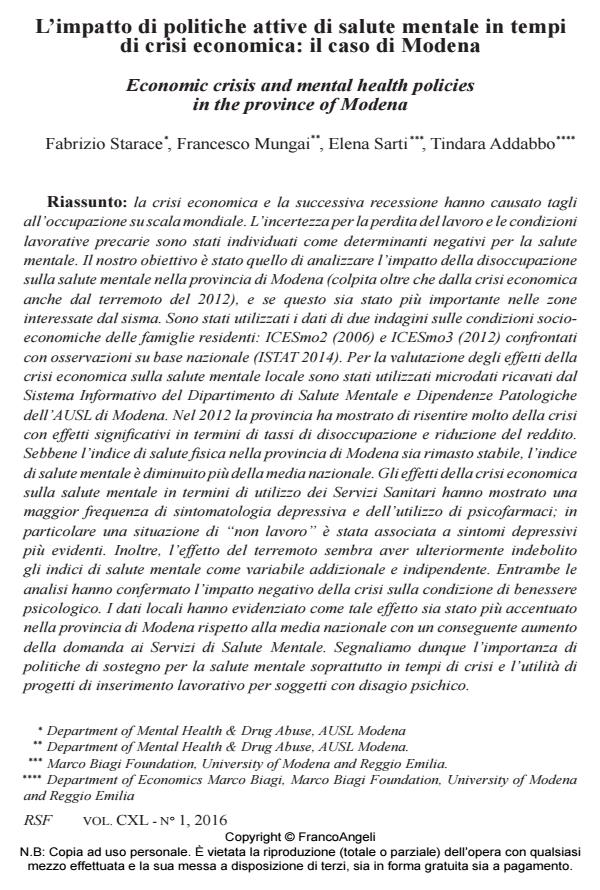Economic crisis and mental health policies in the province of Modena
Journal title RIVISTA SPERIMENTALE DI FRENIATRIA
Author/s Fabrizio Starace, Francesco Mungai, Elena Sarti, Tindara Addabbo
Publishing Year 2016 Issue 2016/1
Language Italian Pages 11 P. 53-63 File size 1710 KB
DOI 10.3280/RSF2016-001004
DOI is like a bar code for intellectual property: to have more infomation
click here
Below, you can see the article first page
If you want to buy this article in PDF format, you can do it, following the instructions to buy download credits

FrancoAngeli is member of Publishers International Linking Association, Inc (PILA), a not-for-profit association which run the CrossRef service enabling links to and from online scholarly content.
The economic crisis and recession caused job cuts, worldwide. Factors of uncertainty, with regard to the loss of employment or precarious working conditions, are now considered negative determinants of mental health. The authors examine the impact of unemployment, and also of the 2012 earthquake, on the mental health status among the population of the province of Modena, to gauge the specific amplified impact in the areas struck by the earthquake. The results of two surveys, that examine the socio-economic conditions of resident households - ICESmo2 (2006), ICESmo3 (2012) - , are then confronted with the data, published in 2014, by the Italian National Institute of Statistics (ISTAT). The surveys assess the consequences of the economic crisis on the local population’s mental health, making use of micro-data retrieved from the mental health information system of Modena’s Local Health Unit. In 2012, the economic crisis hits fiercely the country and brings about unemployment and income loss. Although the physical health status of the population of the province of Modena remains unaltered, on the other hand the mental health status declines more than the national average. The effects of the economic crisis, in terms of use of the mental health services, results in a higher frequency of depressive symptoms and use of psychotropic medication; mainly unemployment generates more evident depressive symptoms. Moreover, the effect of the earthquake, as additional and independent variable, seems to have undermined even more the mental health indices. Both the surveys corroborate the negative influence of the crisis on the psychological well-being of the population and the consequent increase in demand for mental health services. The authors conclude emphasizing the critical importance of sustaining mental health policies - above all during periods of crisis - and of developing projects promoting work integration for people with mental health disorders.
Keywords: Economic crisis, unemployment, earthquake, social determinants, mental health.
- Clinical and Socio-demographic Variables Associated with the Outcome of Vocational Rehabilitation Programs: A Community-Based Italian Study G. Mattei, G. Venturi, S. Alfieri, N. Colombini, S. Ferrari, M. Rigatelli, F. Starace, G. M. Galeazzi, in Community Mental Health Journal /2020 pp.1380
DOI: 10.1007/s10597-020-00577-9
Fabrizio Starace, Francesco Mungai, Elena Sarti, Tindara Addabbo, L’impatto di politiche attive di salute mentale in tempi di crisi economica: il caso di Modena in "RIVISTA SPERIMENTALE DI FRENIATRIA" 1/2016, pp 53-63, DOI: 10.3280/RSF2016-001004